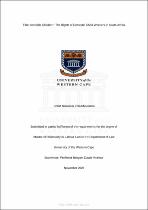| dc.description.abstract | This research paper focuses on the violation of the rights of children aged 16–17 who are school dropouts and employed as domestic workers in South Africa. This is a violation of their rights and occurs in their employment in domestic work, which can be considered a worst form of child labour in third party households in South Africa. This type of work deprives these children of their rights to education, and family life, subjecting them, amongst others, to social isolation and long working ours. Children in these situations are not easy to identify as they are above the compulsory education age, as defined by the South African Schools Act of 1996. However, they are still considered to be children in terms of the Children’s Act of 2005 as well as the Constitution (2006) which defines a child as any person below the age of 18. The Children’s Act of 2005 also addresses child labour, observing it to have detrimental effects on children and their development, thus identifying all children as needing care and protection. Considering this aspect of the Children’s Act of 2005, this research paper scrutinises the role and obligations of the state regarding the protection of children who perform domestic work in third party households. Moreover, the study assesses the obligations of the South African government as a signatory of the UNs’ regional and domestic norms which protect the rights of children. The role of the state as the primary custodian for the advancement and protection of the rights of children is scrutinised particularly in terms of legislation and administration of related policies in pursuance of creating and promoting a child rights-based culture in South Africa. In addition, the ILO’s standards for decent employment for all and those specific to the employment of children are brought to bear in this research paper. The significant role of civil society organisations, the family, the community, and religious sector are brought to bear in terms of their assisting the state to meet its constitutional and global obligations, responsibilities, and commitments with regards to child domestic workers. | en_US |

